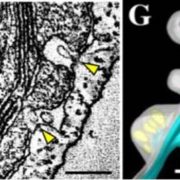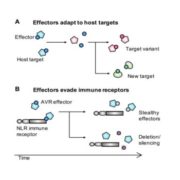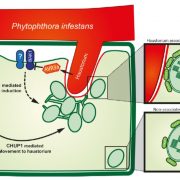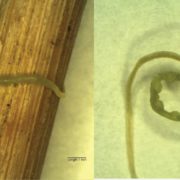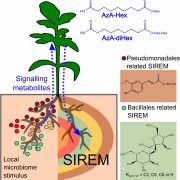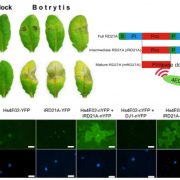Shooting yourself in the foot: Obligate biotrophic pathogen induces protective microbiome in Arabidopsis
 Obligate plant pathogens cannot survive without their host plant. Therefore, understanding how the plant and its microbiome respond to the obligate biotrophs has real challenges in making sure that the response that is being monitored is not an artifact of the experimental step up. A recent study by Goossens et al. showed how the phyllosphere bacterial microbiome of Arabidopsis thaliana plants is affected by the infection of the obligate biotrophic downy mildew Hyaloperonospora arabidopsidis (Hpa). Upon inoculation with Hpa, Arabidopsis plants studied in the Netherlands and Germany developed very similar microbiota, which the authors named Hpa-associated microbiota (HAM). Surprisingly, the researchers showed that the HAM were not helping the pathogen, but instead reduced the disease symptoms of the plants by suppressing Hpa sporulation. When plants were sown in pathogen-conditioned soil, HAM bacteria accumulated in the phyllsophere, showing that plant rhizosphere can recruit these beneficial strains and maintain them on their phyllosphere. It remains to be shown how exactly the Arabidopsis plants can select for this beneficial microbiome. (Summary by Maria Constantin @meconstantin001). Nature Microbiology 10.1038/s41564-023-01502-y
Obligate plant pathogens cannot survive without their host plant. Therefore, understanding how the plant and its microbiome respond to the obligate biotrophs has real challenges in making sure that the response that is being monitored is not an artifact of the experimental step up. A recent study by Goossens et al. showed how the phyllosphere bacterial microbiome of Arabidopsis thaliana plants is affected by the infection of the obligate biotrophic downy mildew Hyaloperonospora arabidopsidis (Hpa). Upon inoculation with Hpa, Arabidopsis plants studied in the Netherlands and Germany developed very similar microbiota, which the authors named Hpa-associated microbiota (HAM). Surprisingly, the researchers showed that the HAM were not helping the pathogen, but instead reduced the disease symptoms of the plants by suppressing Hpa sporulation. When plants were sown in pathogen-conditioned soil, HAM bacteria accumulated in the phyllsophere, showing that plant rhizosphere can recruit these beneficial strains and maintain them on their phyllosphere. It remains to be shown how exactly the Arabidopsis plants can select for this beneficial microbiome. (Summary by Maria Constantin @meconstantin001). Nature Microbiology 10.1038/s41564-023-01502-y


